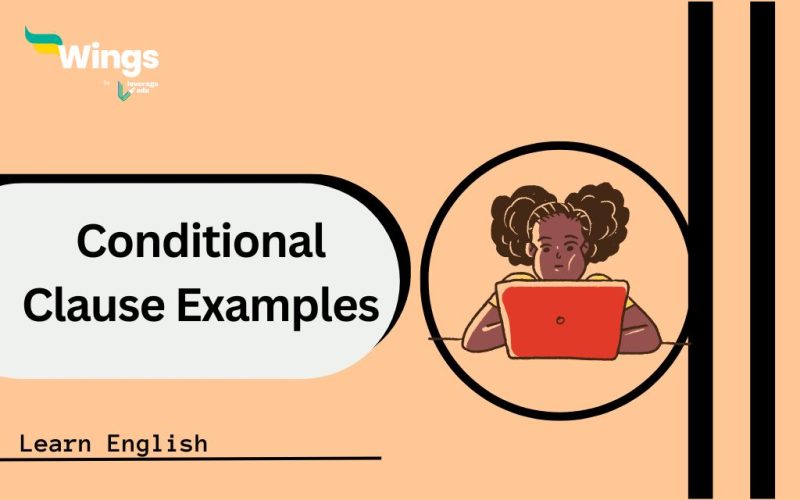Conditional clause examples: In the English language, conditional clauses fall under the category of subordinating clauses, that can not function as a sentence on its own. It always begins with the clause ‘if’ or ‘unless’. For example, “If she had more experience, she would be better at his job.” This connection is important because, unlike a sentence, which is just a collection of words, a clause communicates information about what the subject is or is doing. A clause can frequently—but not always—serve as a standalone sentence because it describes an action or a state of being. To learn more about these clauses through the lens of examples, continue reading this blog.
This Blog Includes:
Must Read: What are Clauses?
Conditional Clause Examples in Sentences
Conditional clauses, also known as conditional sentences or if-clauses, define a condition and its possible outcome. To have a better understanding, below mention are some examples that students can refer to:
Types of Conditional Clauses with Examples
There are four different types of conditional sentences in English. Each represents a different degree of probability that a situation will occur or would have happened under certain cases.
- Zero Conditional Sentences
- First Conditional Sentences
- Second Conditional Sentences
- Third Conditional Sentences
Let’s glimpse at separately of these types of conditional sentences in more detail.
Zero Conditional Sentences
Zero conditional sentences describe general truths—situations in which one thing still forces another. Whereas, you use a zero conditional, you are talking almost a general truth rather than a specific instance of something. Consider the following examples:
Examples:
- If it rains, the ground gets wet.
- If plants don’t get enough sunlight, they die
- If you heat water, it boils.
- If you mix red and yellow, you get orange.
- If she presses down hard, she leaves an imprint.
First Conditional Sentences
First conditional sentences are utilised to describe situations in which the result is likely (but not guaranteed) to ensue in the future. Look at the examples below:
Examples:
- If he studies hard, he will pass the exam.
- If it rains tomorrow, they will stay inside.
- If he goes to the store, can you buy me milk?
- When he heats water, it boils.
- If he exercises regularly, he feels better.
Second Conditional Sentences
Second conditional sentences are good for describing outcomes that are totally unrealistic or will not probably happen in the future. Consider the examples below:
Examples:
- If he had a million dollars, he would travel around the world.
- If you lived in Germany, would you speak German?
- If we could fly, we wouldn’t need aeroplanes.
- If they spoke English, we could communicate better.
- If the weather were pleasant, we would go to the beach.
Third Conditional Sentences
Third conditional sentences are used to demonstrate that present possibilities would be different if something different had occurred in the past. Glimpse at the following examples:
Examples:
- If he had studied harder, he would have passed the test.
- If they had saved more money, they could have gone to Paris.
- If I had known you were coming, I would have baked cookies.
- If she had arrived earlier, she wouldn’t have missed the movie.
FAQs
Conditional Clauses begin with the conjunction “if,” and subordinate clauses that describe hypothetical situations. They are used with a main phrase (e.g. “If you’re late again, you will be fired”) that outlines the potential outcome of the hypothetical situation.
Conditional comes in four fundamental varieties: zero, first, second and third. Additionally, one can mix them up by using one form of conditional in the first part of a statement and another in the second. These are generally referred to as “mixed conditionals.”
Conditional clauses have a very basic structure. Although we can add more information and utilise several tenses, the fundamental format typically looks like this: If + Condition + Outcome: outcome I’II hug her if we cross paths. Outcome + If + Condition: Should I run into her, I’ll say hello.
Related Reads:
| Parts of Speech | Article Rules |
| List of Conjunctions | What are French Prepositions |
| 101+ One Word Substitutions | How to Use Nouns and Prepositions |
| English Grammar Preposition | Best Podcasts to Improve English |
This was all about the conditional clause examples in English grammar. I hope you understand the concept and know how to proceed. You can also follow the Learn English page of Leverage Edu for more exciting and informative blogs.
 One app for all your study abroad needs
One app for all your study abroad needs














 45,000+ students realised their study abroad dream with us. Take the first step today.
45,000+ students realised their study abroad dream with us. Take the first step today.

